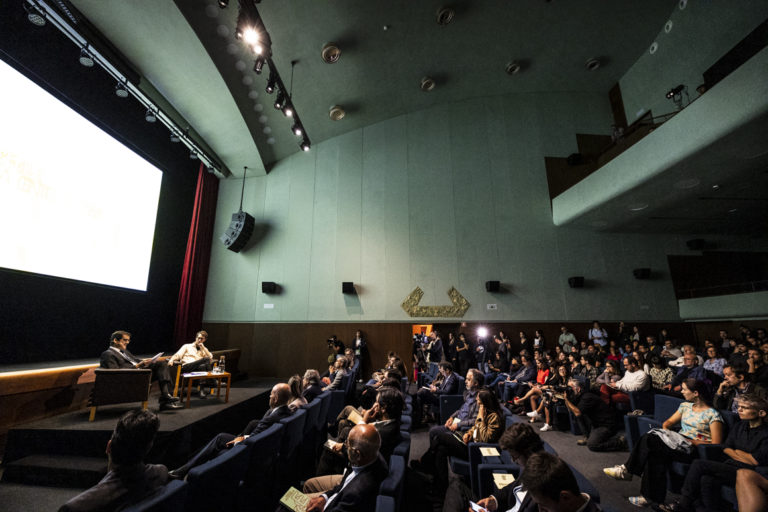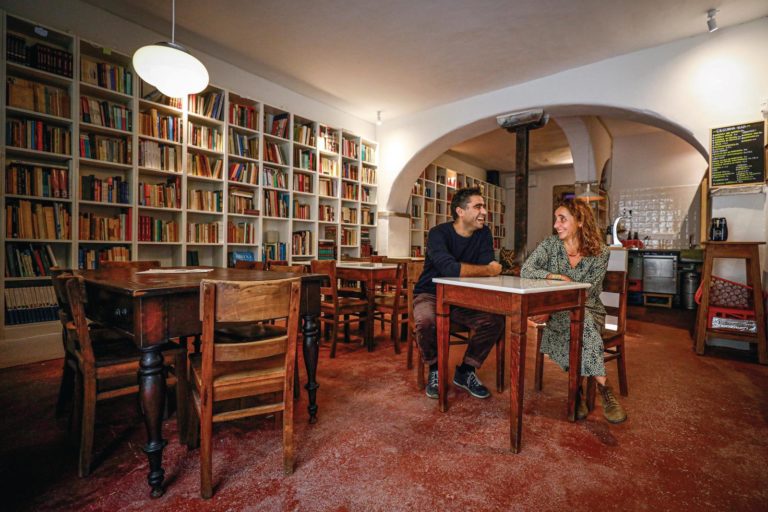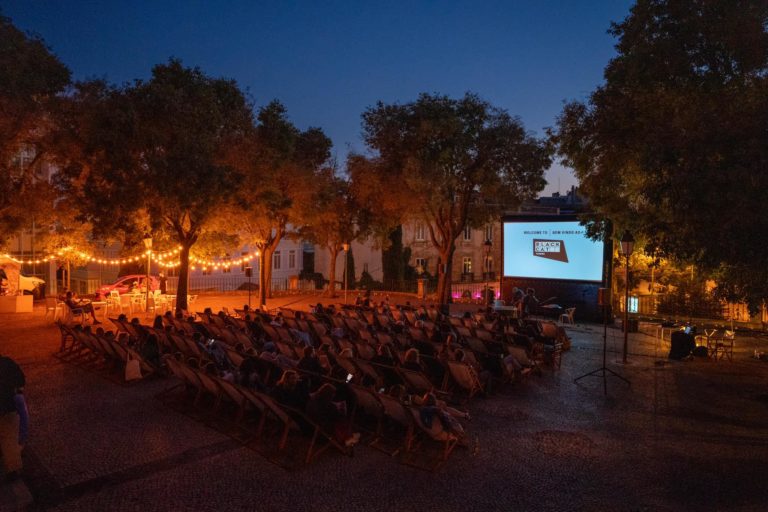Author: João Pedro Soares
While streaming platforms dominate the audiovisual landscape, independent Portuguese cinemas stand as resilient spaces of culture and community. These cherished venues defy the decline of traditional cinematic rituals, offering not just films but dynamic spaces for connection, conversation, and cultural exchange. From Lisbon's Casa do Comum to Porto's Cinema Batalha, these cinemas enrich culture by blending film with libraries, bars, and eclectic programming. They preserve the heart of cinema as a shared cultural experience.

The screening room of Cinema Batalha in Porto – © Guilherme Costa Oliveira
Any old-school cinema-goer in Portugal can recall the days of when everyone gathered in a dark room to watch a classic film in silence or went to a video club to rent some VHS tapes to watch at home with friends and family. Some say those days are gone, that the ritualistic experience of cinema is dying under the pressure of streaming platforms, and those moments and places seem harder and harder to find.
Fortunately, there is still some resistance to the pressures of an increasingly global and capitalist society, and independent Portuguese cinema venues continue to tell their story. These spaces continue a tradition of cultural resilience that mirrors similar efforts across Europe, such as Commune Image in Paris or Trauma Bar und Kino in Berlin. Places like this contradict the pessimistic view of the state of the audiovisual panorama and offer a refreshing alternative to the cinematic experience. These independent spaces are few and far between, but they have all found ingenious ways to challenge the commodity of home watching, by creating environments where cinema can be more than just watching films, it can be a place to meet with friends, have a drink, and maybe even take part in other cultural events.
Cinemas as a Central Pillar of the Cultural Scene
If we think of cinemas as pillars of the cultural scene, in Portugal these spaces often offer much more than just a cinematic experience. They combine elements such as cafés, libraries, and, of course, cinema, creating a richer cultural environment. Casa do Comum opened in 2023 and has quickly established itself as a dynamic, alternative centre for art and culture in Lisbon. Situated in the centre of the city, its location allows it to be at the epicentre of change when it comes to cultural offerings in the Portuguese capital. It has a consistent programme of indie films on the ground floor and an independent library upstairs, all complemented by a bar serving food and drinks. Although this space does not define itself as a proper cinema as one recognises it (a spacious dark room, with a big screen and high-tech sound system) the intimacy, accessibility, and informality of the environment make the whole cinematic experience worth a visit. The cultural programme is eclectic, balancing films with concerts and performances, DJ sets, and even regular debates on politics, culture, and the current affairs.
In Porto, another similar initiative is Cinema Batalha, a recently restored venue, and one of Porto’s cultural landmarks, which had been closed for twenty years. Reopened in 2022 with a fresh new look, it now proudly calls itself the “Centre of Cinema” and truly lives up to the title. Although its restoration was funded by the city council, its programme is firmly focused on independent and peripheral cinema, steering clear of mainstream blockbusters. This makes Cinema Batalha a must-visit for those seeking a more curated and meaningful cinematic experience in the city, and in the same way as Casa do Comum, it balances cinema with a restaurant/bar and a library, albeit in a more polished setting.

An interior look of Casa do Comum with the owners – © José Carlos Carvalho
Spaces of Social Connections
There are also those venues with such a lively atmosphere that one could say the cinema itself is sometimes secondary to the social connections it fosters. These venues not only offer the chance to see a great film, but also to enjoy drinks, snacks, and conversation with friends—perhaps even continuing the night with a post-screening party. Cinema Ideal in the centre of Lisbon is a prime example. It has an excellent catalogue of films and is connected with some of the major Portuguese film festivals. Cinema Nimas, also in Lisbon, has a regular programme and occasional Q&A sessions with film directors. For special events related to independent film festivals or a rare screening of a very particular film, Cinema São Jorge is one of Lisbon’s oldest cinemas, with a bar and a restaurant with a balcony, which is unfortunately only open on special occasions, so one has to pay close attention to their programme. These three venues are iconic pillars of Lisbon's cinematic culture, often considered the mecca of the city's cinephilia (along with Cinemateca – Museum of Cinema) and a stronghold for film enthusiasts.
The northern region also has some excellent venues for this types of cinema, creating a rich and varied cinema culture outside the capital. Cinema Trindade one of the oldest venues in Porto, offers a catalogue of mainly Portuguese and European cinema, and is always a good place for a coffee break. For fans of experimental and cult films, Cinema Passos Manuel is a significant spot, known as one of the most alternative places to see a film in Porto. Its film sessions are as iconic as its legendary parties. Beyond the cinema, there’s a bar and club downstairs, where some of the city's underground moments take place, making it a space for both film lovers and night owls.

Open air screening by Black Cat Cinema – © Black Cat Cinema
Rethinking Urban Organisation with Independent Open-air Cinema
This independent movement of Portuguese cinemas transforms them into cultural meeting points while also encouraging a rethinking of urban spaces, particularly through open-air cinema initiatives. For cinema-goers who prefer to enjoy the outdoors, Black Cat Cinema offers a good alternative to the casual cinema experience. Their screenings take place at different locations around the Portuguese capital, and one can keep track of them via social media or their website. What makes their initiative unique is that they specialise in open-air cinema–you can get together with a few friends, get some drinks and food, and enjoy a film under the stars. There is also an independent festival organised by a small group of friends called Cinema no Estendal, which shows independent and experimental films that one probably never heard of, in interesting sessions that always come as a surprise. Their concept is to prepare spontaneous open-air sessions in typical neighbourhoods around the Lisbon area, in public gardens or closed streets, inviting the local community and outside visitors to watch films, in sessions that are free to attend.
Then, perhaps more unconventionally than the urban organisation of cultural spaces, there are local cinema clubs in small towns that still offer unique film experiences. The student-run Casa de Coimbra, but also Cineclube de Faro host open-air screenings during the summer. They defy the conventional, structured, and perhaps hierarchical setting of a formal cinema, creating spaces that embody a certain ‘anarchic’ spirit of enjoyment of art and culture. Although such venues are becoming increasingly rare, these hidden gems are well worth seeking out. With a bit of research or simply asking around, you can discover these intimate, memorable spaces that continue to cultivate a deep love of cinema and offer a distinctive and often unforgettable atmosphere.
Independent cinemas in Portugal may be few in number, but they remain resilient against the tides of mainstream media and the convenience of streaming platforms. The fact that they are independent allows them to mutate and create new forms of existence, leading to a sense that the future of cinema is better suited to this type of initiative, which generates a community spirit that connects people and fosters relationships that go far beyond the viewing experience. These cinemas maintain a genuine love of film, often through the dedication of volunteers and professionals alike, and demonstrate the strong sense of community they create. As cultural centres, they preserve a unique cinematic experience that endures, providing an alternative space where people come together, not just to watch films, but to connect with each other.
Published on January 7th, 2025
About the author:
João Pedro Soares is a filmmaker, writer, and researcher pursuing a PhD in Artistic Studies at NOVA-FCSH in Lisbon. His doctoral research explores the intersection of ecology and contemporary Portuguese documentary cinema.